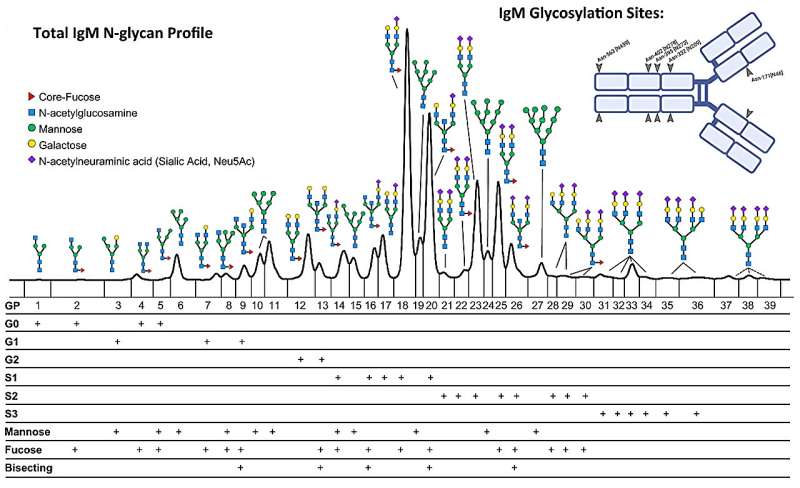This article has been reviewed according to Science X's editorial process and policies. Editors have highlighted the following attributes while ensuring the content's credibility:
fact-checked
trusted source
proofread
Researchers find possible predictor of COVID-19 severity

The degree of severity to which someone experiences COVID-19 has a lot to do with the body's immune response to the SARS-CoV-2 virus and the infection it causes. Our immune system tailors antibodies to fight infections, so they are often used as an indicator to determine what type of illness we're up against or how sick it's likely to make us.
Looking closely at one of the antibodies produced to fight COVID-19, researchers at Drexel University's College of Medicine have uncovered a trait that could be used to predict the disease's severity.
The finding, which was reported recently in the journal Nature Communications, is tied to the presence of sugar structures, called glycans, that modify antibodies and affect how they function.
Early COVID-19 research focused on this modification, called glycosylation, as it occurred in long-lasting immunoglobulin G antibodies. The Drexel team's discovery came from looking at an antibody produced earlier in the immune response known as immunoglobulin M (IgM).
"IgM plays a major role in how the immune system responds to pathogens like bacteria and viruses," said co-senior author of the research Mary Ann Comunale, EdD. "No one was looking at IgM glycans, so we made it the target of this work." Comunale is an associate professor and glycobiologist in the College of Medicine with over two decades of biomarker research experience focusing on glycobiology.
The Drexel research group, led by MD/Ph.D. candidate Ben Haslund-Gourley, a student in the Comunale lab at Drexel's College of Medicine, found that changes in the glycan structures attached to IgM were associated with the severity of a patient's COVID-19 infection—and these changes in glycans may influence how the antibodies combat infection.
"What this paper tells us is the immune system is changing the glycans on IgM—especially during severe disease," said co-senior author Elias El Haddad Ph.D., a professor of microbiology and immunology in the College of Medicine. "Although there is no rapid test to look at these glycans in hospitalized patients, these findings may serve as a starting point for understanding the immune system's response."
Blood samples used in the study came from hospitalized COVID-19 patients participating in the Drexel cohort of the National Institute of Allergy and Infectious Diseases "Immunophenotyping Assessment in a COVID-19 Cohort Study" (IMPACC), of which El Haddad and study co-author and College of Medicine Dean Charles Cairns, MD, serve as principal investigators. Researchers kept tabs on the patients, tracking the first 28 days of their illness.
"Once IgM binds to its target, it activates a cascade of proteins, known as complement, that attack cell walls," El Haddad said. "While this activity can help fight infections, overactivation of complement can lead to organ failure."
Severe COVID-19 infections have higher complement activity, a mechanism the body uses to fight pathogens. The Drexel team's research suggests that the glycans on IgM could partly be responsible for this over-activation during severe disease.
"These findings suggest that identifying IgM glycans could identify patients at risk for severe disease at an early stage of the infection and help guide management," Cairns said.
"The glycosylation of an antibody is essential when developing therapeutics," Comunale said. "Antibodies can have pro- or anti-inflammatory effects depending on the glycans present. Glycoengineering is a way to fine-tune an antibody to kill a pathogen more effectively and ensure you are not causing an increase in the patient's inflammatory response. Hence, these results inform the development of immunotherapy strategies for viral diseases."
The authors hope this study on 22 patients leads to larger patient studies that verify these results, and future research that looks at IgM and IgG in patients after they leave the hospital to see if those glycans can help predict long-COVID symptoms.
"The collaboration started when Ben, a student in my lab, learned of the IMPACC study from his peer Kyra Woloszczuk, a student in the Drexel lab of Elias El Haddad Ph.D., bringing together experts in glycobiology and in immunology," Comunale said. "The results of this work highlight two key points required for translational research: the importance of collaboration and the patient's willingness to engage with scientists."
More information: Benjamin S. Haslund-Gourley et al, IgM N-glycosylation correlates with COVID-19 severity and rate of complement deposition, Nature Communications (2024). DOI: 10.1038/s41467-023-44211-0


















